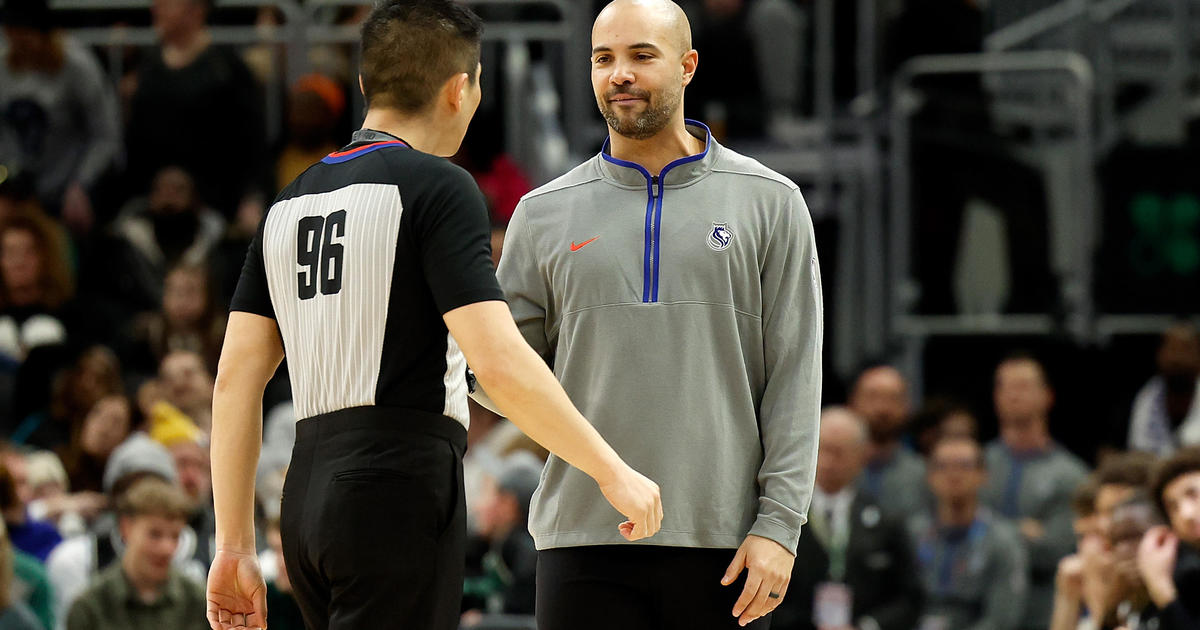Gallof: Astonishing Political Bickering Ultimately Led To Islanders Leaving Nassau
By B.D. Gallof, WFAN.com
NEW YORK (WFAN) -- The words were telling and, ultimately, proved prophetic.
"If Nassau does not provide the appropriate venue there are other municipalities that will. It is a real possibility, and a situation that must be taken very seriously by Nassau County." -- 2006 Nassau County Legislative Report, Nassau County Office of Legislative Budget Review.
You might ask yourself: "Well, B.D., the Islanders ended up in Brooklyn: Why should be care on what happened in Nassau County?"
My answer: What happened in Nassau is important, not only for those poor fans but also for residents who will now be affected by the county's loss of revenue in entertainment tax and sales tax. Most of all, it is forever a symbol of Nassau County's clear and present decline of debt, increase in political infighting, and overall inability to understand the dire urgency to keep positive attributes to the county intact and on location.
For those who have followed those writers chronicling the misadventures of the venue situation for Long Island's sole professional sports team like Nick Giglia, Dominik of Lighthouse Hockey, Kevin Schultz, Newsday's Randi Marshall, and others, including myself, you have been privy to a long, heart-breaking, and intolerably frustrating tale.
We have been trying to glean truth from the murk, politics, public relations, and in many cases, a fierce lack of reporting and coverage by mainstream press. Others got lost in the PR, stuck on just reporting one side of what was a nuanced, convoluted, and wholly mishandled hodgepodge of a situation.
This ongoing series will focus on shining a light in an attempt to autopsy why the NHL not only died in Nassau County, but who helped hammer in the nails of the proverbial coffin.
What should be very clear: Brooklyn did not steal the Isles away from Nassau. Instead, reality is, had not Brooklyn been the saving grace, the Islanders would be likely heading out of the New York are entirely.
The business realities of the team demanded financial certainties that Nassau could no longer provide. Though very little is known about the Islanders' 25-year ironclad lease with Barclays Center, I was told all along that team owner Charles Wang had been looking for profit guarantees that would result in him no longer millions of dollars per year.
The total losses that Wang has eaten as owner of the Islanders might be well over $250 million, which eclipses the $187.5 million that the team had cost in 2000.
It is in fact entirely possible that by the time the Islanders finally move to Brooklyn in the 2015-16 season, they will have cost Wang a total of a half a billion dollars in team cost and losses, preventing the team from gaining financial solvency.
In fact, this information was made clear to the Republican and Democratic leadership of Nassau County, thanks to a 2006 report:
"SMG has enjoyed between a $600,000 and $2.5 million profit annually, and the team has lost between $12 million and $27 million annually," the report stated.
The fact is, despite complaints that the Islanders did not and still do not derive a part of the SMG profit, even had they have, they still would have been losing massive amounts of money per year. It also wipes away the farce that the SMG deal that Alphonse D'Amato struck was the primary issue. The lease was an issue, but it went much deeper.
Additionally, all of the problems pretty much set the table for why the Islanders wanted to piggy-back some sort of real estate venture like the Lighthouse Project in order to remain solvent, a Lighthouse Project that screeched to a halt thanks to a hearing with the Town of Hempstead, which cited issues of traffic, infrastructure cost to handle bigger size and scope, and concerns on how that would affect "the suburban sprawl."
I spoke with Nassau Democrat head and former New York State Democratic Chairman Jay Jacobs recently in a hope to shed some light on his and the Democrats; stance on the Lighthouse Project:
Jacobs said while the Town of Hempstead spoke publicly on the issue of size, to which Wang was prepared to negotiate, he believes that the Town of Hempstead and Kate Murray didn't want a deal.
The question is why?
According to Jacobs, Nassau County Republicans did not want the head Democrat in the county, then-Executive Tom Suozzi, to get the credit.
Score 1 for political infighting.
Jacobs also said there was belief that a directive from Post Ave (The Republican Party headquarters headed by Joseph Mondello) that it was not to happen.
He also said Wang did not want to "play ball" with that Republican machine, which had to do with hiring the "right" lawyers, firms, etc., that conveniently just happened to be the ones lining up their campaign coffers.
Since Wang refused to play that game, according to Jacobs, his belief is that the Republicans "killed it."
Score another for political infighting.
As for Suozzi failing to secure what were very available infrastructure dollars for transportation and sewer upgrades (stimulus, capital budgets, Federal New Starts funds, etc.), Jacobs said that was "Pure nonsense. No basis in fact."
Based on the Lighthouse Project Legislature Report, its take was that many of the public works and sewage costs would have been covered by those residents who were to come in, plus the fact that as of 2006, those works were operating evenly or even at surplus. This might also raise a counterpoint in addition to Jacob's comment, and might give some contemplation if public works, sewage and water just became a "reason" to halt the process than actually being a clear problem.
As for the ill-fated $00 million referendum pushed by Suozzi's replacement, Edward Mangano, Jacobs said, "Don't blame the Democrats for opposing a bad idea. The problem with Mangano's plan was that NOBODY talked to the Democrats."
Score 3 for political infighting.
Add to this the fact that, as I reported at the time, nobody told NIFA: the oversight committee to all of Nassau County's spending either.
Jacobs' take on the referendum was that it was to float $400 million on top of the more than $3 billion already owed by Nassau County. The Democratic Party's stance was that too much borrowing by the county was being left on the taxpayer. NIFA's own reaction was the same.
Jacobs' stance is that the Islanders are a private entity entitled to make a profit or lose money. Profit goes to team pockets, but in referendum losses would then come out of taxpayers' pocket. Assumptions of clearing profit and audience were being made without any nets in place for if marks were missed. If missed, then it would fall to the taxpayers.
The Democrats' bottom line, according to Jacobs, was that the taxpayers of Nassau should not pay more property taxes to keep Nassau Coliseum rolling.
The Democrats preferred a private deal with a measure of borrowing that would not have had a direct impact on taxpayers, Jacobs said.
Jacobs also reminded those who still blame the Democrats for the referendum's failure that they only spent a mere $50,000 to beat the referendum. He stipulated that they wanted to work for what was sensible solutions to problems, not just "any idea."
Ultimately, Jacobs said, the referendum was NOT the last shot, and that substantive work was done after the failure of the referendum.
Jacobs said after referendum failed he reached out to Wang and Mangano to work on a private plan with public support that "they could afford." The idea was to get investors to supply 20-30 percent with banks loaning out rest.
One issue they ran into was Wang only wanting to put out so much money, Jacobs said.
Meanwhile, Mangano's office was concerned about any bonding deals after having lost the referendum vote. They were, according to Jacobs, "gun-shy" after having been embarrassed.
All three sides did meet after the failure of the referendum. The idea put forth was that the county could afford $80 million-$120 million in bonding that would be paid off by proceeds from allocating the entertainment tax that came from the Coliseum.
There was also a belief from Mangano that the Democrats would abandon or not be on-board. Jacobs said the Democrats would have indeed been on-board and told Mangano so. Jacobs said Mangano was more interested in finding a way so that it would be his singular achievement. Jacobs said he felt it was a mere inches in terms of making the post-referendum deal happen, but Mangano "dropped the ball."
Wang felt that clock was ticking and thanks to his experience with the Lighthouse Project and referendum failures, he finally cited to all sides about a lack of focus in a new phase, and that the team would start looking outside the county for viable options. This as he was telling fans at the end of the season that he was still holding out for Nassau? I'm of the belief, considering my connection to all sides Wang was looking elsewhere earlier than most figured.
Jacobs said he believes that Wang, ultimately, wanted the 77 acres the "Hub" sits on all handed over to him, but truth be told, Jacobs and Mangano did not have the flexibility to hand it all over to the Islanders' owner.
When Mangano then started a new RFQ for developers, Wang no longer wanted to play ball. He was insulted that he would have to go through it all again (having done it with Suozzi). Plus, there were substantial costs, as well, that would have had to incur during the process.
Jacobs contended that the two sides, both disappointed in the past and skeptical about the future, let it drop.
So, in asking Jacobs to list who he and the Democrats feel are the main culprits in Nassau's loss of the Islanders, he said:
First and foremost, Town of Hempstead Supervisor Kate Murray (with Joseph Mondello behind the curtain).
As for the final result of the Islanders now signed to play in Brooklyn for 25 years starting in 2015, Jacobs said solemnly: "The Islanders not in Nassau is tremendously terrible for Nassau County."
Having had the Islanders remain in Nassau "takes a bit of leadership," Jacobs said. Of course, as he said that, I immediately envisioned the next election party line for the Nassau executive.
The bottom line, according to Jacobs, was that "The [Republicans] did not want [the Democrats] to get credit for such a major, beneficial project, so they found reasons to kill it. As for all of their motivations, one can only speculate."
But, as most of us who have been reading the long convoluted history on the venue situation, know we can speculate quite a bit.
Having said all of this, I'll leave you with one last quote from the 2006 Legislative Report:
"Losing a primary tenant presents a situation that exacerbates the financial peril of the Coliseum and presents negative economic and fiscal impacts for the County."
Score many, many more for political infighting.
Read more columns by B.D. Gallof and follow him on Twitter at @BDGallof
Who do you blame for the Islanders jumping ship for Brooklyn? Please offer your thoughts in the comments section below ...



